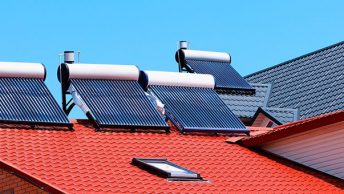First, what is an energy audit? Depending on who you are talking to, you will receive a wide range of answers to this seemingly simple question. In essence, an Online Energy Audit is a home diagnostic to assess your home’s overall energy performance – how efficiently your home produces, uses, and loses energy. Similar to the difference between a brief doctor’s office exam and a comprehensive physical exam, a home energy audit can vary in its thoroughness. In our opinion, there are some key components that should be included in any energy audit, which we will discuss below.
Checking the blower door
The fan door test determines how well the home is insulated and airtight. This is the slowest and therefore the most expensive part of an energy audit. However, without it, you’re really just making an educated guess. In the fan door test, an industrial-size fan is attached to the front door and draws air out of the house. In places with insufficient insulation or holes in the frame of the house, the outside air will be drawn into the house. Based on the amount of air entering the home from outside, you can accurately measure how well it is insulated and insulated.
Infrared image
When combined with a fan door test, infrared imaging is the best way to identify specific gaps in your home’s siding and insulation. An infrared camera shows the difference in surface temperature. Since outside air enters the house when the fan door is checked, the camera can be used to find problem areas by showing changes in temperature.

Insulation test
During an energy audit, the quantity, quality, and age of insulation should be verified, focusing on attic and basement / basement insulation.
HVAC inspection
Heating and cooling costs can often be eliminated by solving simple maintenance problems associated with a furnace or central air conditioning unit. For devices older than 15 years, it often makes sense to completely replace the device. The energy auditor should recommend any necessary maintenance or, if necessary, recommend replacement of the unit.
Duct Leak and Airflow Assessment
Air ducts and vents should be inspected for leaks or damaged areas. The ability of your HVAC equipment to efficiently and safely heat or cool your home is directly related to the ducts and vents in your home. They should always be tested together.
Most energy audits should also check the efficiency of appliances, lighting, and shower heads. Upgrades made within these categories provide significant energy savings, although with the correct information, most homeowners can make an informed decision on these items without an energy audit.






